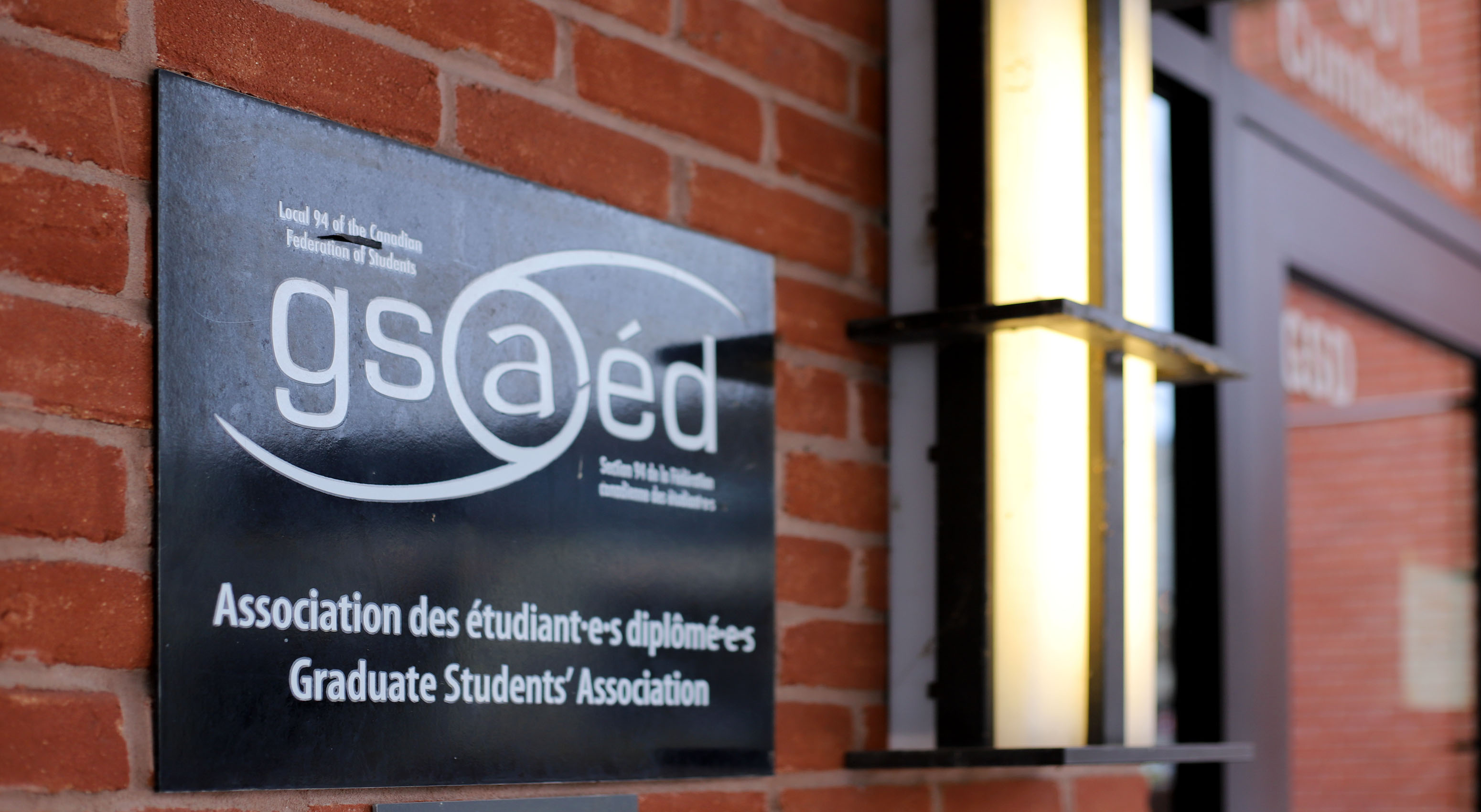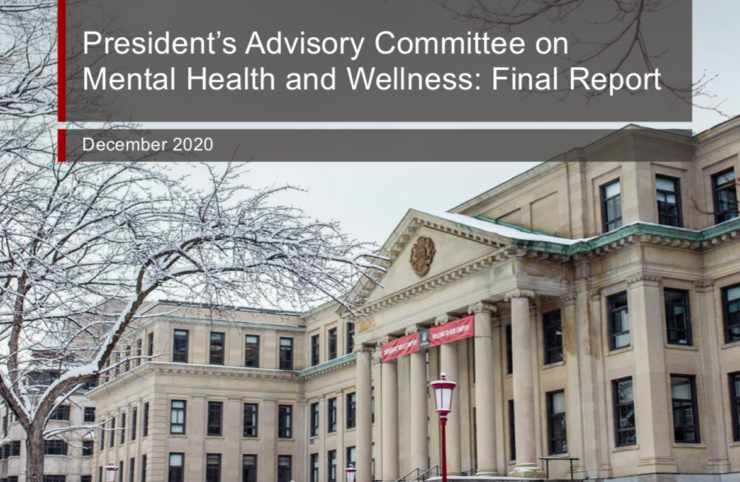From a lack of resources to racial barriers to support, grad students point to gaps in U of O’s mental health system
Content warning: Suicide
The Graduate Students’ Association of the University of Ottawa (GSAÉD) hosted a roundtable for graduate students on Monday to discuss mental health issues on campus and the possible solutions for them.
For students who are studying off the main campus downtown, resources are limited, said PhD nursing student Emily Marcogliese.
“I would say that the access for resources for us is much more limited, regardless of what kind of resource that is,” said Marcogliese, who attends the Roger Guindon Hall (RGN) campus for her studies. “ We are located separately from the main campus. So in terms of any kind of mental health services, we don’t have, as far as I know, any access to any point of contact there, as well for any physical needs. We don’t have any access there other than going to the actual hospital.”
Marcogliese said one of the solutions that stood out to her from the roundtable was centralizing the university’s mental health resources. Students who attended discussed ways this could happen, whether it be a person who has all the information that can direct students to areas and resources on campus, to a website with all the links and descriptions that make it easier for students to access.
“Right now, (students) don’t know who to turn to but their friends and their peers, who are wonderful sources of support, but are not the necessary professional services that may be needed given the severity,” said Marcogliese.
University of Ottawa president Jacques Frémont acknowledged in February that the campus was experiencing a mental health “crisis” after the fifth student death in the past 10 months. The administration has struck a task force that is looking to implement recommendations from a recent report on mental health and wellness at the university, as well as build relationships with local hospitals and engage with students for their input.
Marcogliese said students are creating their own mental health support groups on the RGN campus to better support one another. The Nursing Student Association, for example, hosts a Beating Burnout event, designed to talk about the mental health of medical professionals. Marcogliese said she knows the signs and symptoms of burnout after suffering from it herself.
“I think that the nursing practice as it is right now is really unsustainable, where we keep getting asked to do more with less,” she said. “Things even as basic as shift work are really difficult on your mental health in ways that you wouldn’t necessarily know or imagine.”
External commissioner of the GSAÉD, Maïté Girard-English, said the union is aware of some of the existing issues on campus and is working to find solutions.
On Tuesday, the GSAÉD board voted to create a mental health committee to be a voice for students as well as to find solutions to the problems the campus is facing.
Girard-English highlighted the fact that the GSAÉD already has an online mental health service, but said judging from the usage online and the lack of knowledge of it at roundtable, they need to do more to reach students with the resource.
My Student Support Program (MY SSP) is a resource available 24/7 in which students call, text or talk online in multiple languages. It can be downloaded on students’ phones, connecting them to a counsellor.
One issue the GSAÉD is working on solving to create better access to resources is increasing the reimbursement fee for counselling. The GSAÉD will currently reimburse students $40 for up to 20 sessions of counselling, but entry-level rates for a counsellor start at $150, said Girard-English.
Another issue graduate students face is the relationship with their supervisor, said Girard-English.
“Sometimes the power dynamic can cause a lot of stress and anxiety,” said Girard-English. “Also the lack of accommodation for students when it comes to writing your thesis or teaching as well, or even just regular coursework.”
According to Girard-English, graduate students at the U of O who work as teaching assistants are paid the highest in Ontario at $43 an hour but can only work 10 hours a week.
“It may not be enough for someone to live,” said Girard-English.
Scholarships can help with financial support, but many of them do not offer flexible timelines for students who may need to take time off for mental health resources, she added. Girard-English said many students take jobs outside of campus, working another one, two or three jobs to support themselves while studying, and that can take a toll.
For Sammy Omyeama-asony, online apps break down some of the barriers that Black students can face when trying to access resources without stigma.
“I think resources at the school have to address the unique experiences of racialized and Black folk,” said Omyeama-asony, who is pursuing a PhD in geography. “We have experiences that have to deal with structural, systemic racial discrimination. I think addressing those issues specifically for Black folks and racialized folks is very, very important to the entire solution.”
One of the barriers Omyeama-asony said he faced when accessing resources at both Carleton University and U of O was the lack of communication between the two schools. He said he had to apply for accommodations at both schools, despite already being approved at U of O. For him, jumping through hoops for a course at Carleton was not worth the stress on his mental health, Omyeama-asony explained.
“I think to make it simple and seamless would be best for the students, as well as less challenging for the students,” he said. “Because talking about trauma over and over again could re-traumatize people.”
Marcogliese said the workshop is a step in the right direction and added that it’s important to help graduate students feel like their voices are heard.
“I don’t know that my story is particularly unique,” said Marcogliese. “I think that graduate school is hard. So if I had anything to contribute and if I ever have the opportunity to have my voice be heard, I really like to take those opportunities to create some kind of change.”
Read More:
- U of O president acknowledges mental health ‘crisis’ in wake of student death
- Students protest outside U of O president’s office for better mental health services
- Students demand action on improving U of O’s mental health system at town hall
A non-comprehensive list of local mental health resources appears below…
On campus…
- University of Ottawa Health Services (UOHS), 100 Marie-Curie Private
- Offers counselling, psychiatric services, individual, couple or family therapy, access to psycho-educational groups and referrals to specialists off-campus
- Student Academic Success Service (SASS), 100 Marie-Curie Private
- Offers individual counselling, peer-counselling, workshops, online therapy and group counselling using new stepped model; referrals
- Faculty mentoring centres (locations differ by faculty)
- Specialized mentoring services catered to the needs of students in each faculty
Off campus…
- Mental health hotlines…
- Drugs and Alcohol Helpline: 1-866-531-2600
- Canada Suicide Prevention Service phone available 24/7: 1-833-456-4566
- Fem’aide: 1-877-336-2433
- Good2Talk: 1-866-925-5454
- Kids Help Phone: 1-800-668-6668 or text CONNECT to 686868
- Mental Health Crisis Line: 613-722-6914
- Distress Centre of Ottawa and Region: (613) 238-3311
- Ottawa Rape Crisis Centre: 613-562-2333
- Tel-Aide Outaouais: 613-741-6433
- Trans Life Line: 1-877-330-6366
- Walk-in counselling clinics (six Ottawa locations)…
- Somerset West Community Health Centre (55 Eccles Street)
- South-East Ottawa Community Health Centre (1355 Bank Street)
- Family Services Ottawa (312 Parkdale Avenue)
- Jewish Family Services of Ottawa (300-2255 Carling Avenue)
- Ottawa Community Immigrant Services Organization(959 Wellington St. W)
- CFS/SFC Ottawa (310 Olmstead Road)
- Community health and resource centres (13 in Ottawa)
- Carlington Community Health Centre (900 Merivale Road)
- Eastern Ottawa Resource Centre (215-1980 Ogilvie Road)
- Nepean, Rideau and Osgoode Community Resource Centre (1547 Merivale Road, Unit 240)
- Rideau-Rockcliffe Community Health Centre (225 Donald Street)
- Sandy Hill Community Health Centre (221 Nelson Street)
- South East Ottawa Community Health Centre (1355 Bank Street)
- Western Ottawa Community Resource Centre (2 MacNeil Court)
- Centretown Community Health Centre (420 Cooper Street)
- Lowertown Community Resource Centre (40 Cobourg Street)
- Orleans-Cumberland Community Health Centre (240 Centrum Boulevard)
- Pinecrest-Queensway Community Health Centre(1365 Richmond Road)
- Somerset West Community Health Centre (55 Eccles Street)
- Vanier Community Service Centre (270 Marier Avenue)
Warning signs of suicide include:
Talking about wanting to die
Looking for a way to kill oneself
Talking about feeling hopeless or having no purpose
Talking about feeling trapped or being in unbearable pain
Talking about being a burden to others
Increasing use of alcohol or drugs
Acting anxious, agitated, or recklessly
Sleeping too little or too much
Withdrawing or feeling isolated
Showing rage or talking about seeking revenge
Displaying extreme mood swings
The more of these signs a person shows, the greater the risk. If you suspect someone you know may be contemplating suicide, you should talk to them, according to the Canadian Association for Suicide Prevention.





